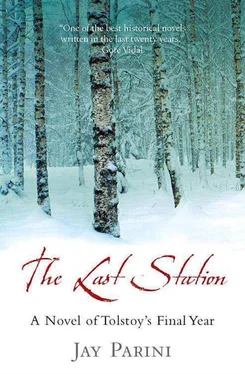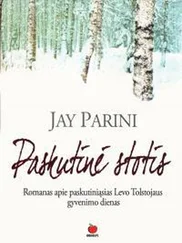When my sisters and I were teenagers, Papa would put tapers in the window once a week, as was the custom then – to signal our ‘at home.’ We waited, Lisa, Tanya, and me. We all loved Count Tolstoy desperately, though Papa and Mama assumed that Lisa, as the eldest, was the obvious mate for him. I was the middle girl, slender and dark-eyed, with a soft, reedy voice and teeth like ivory. I was the envy of Lisa, who was a cat – clawing and mewing, slinking about the house. Lisa had brains, yes. She was an ‘intellectual.’ But she was pompous and, if I do say so myself, a fraud.
Tanya could have been more dangerous. She was all mischief and commotion, eyes black as coal, with hair cut straight across her forehead like an Oriental whore. When she walked across the room, every muscle in her body signaled to the world. I hated her then. Who could tolerate the fetching way she would dance and sing, her grandiose schemes for ‘making it’ in the theater? As if Papa would let one of his daughters spread her tail feathers on the Moscow stage! Poor Papa.
I don’t think I was as difficult as the others. Nor should it have surprised anyone that Count Tolstoy chose me over my sisters. Though not brazen about it, I had accomplishments. I could play the piano – not like I do today, though not so badly either. My watercolors were passable. I could dance as well as most girls of my rank and position. And I could write like the wind – stories and poems, diaries, letters. Then, as now, Lyovochka had an instinct for self-preservation. He has always known how to get what he needs.
I first met the count when I was ten. He had come to visit Papa in the Kremlin, where we had an apartment, his dark mustache drooping, his uniform perfectly pressed, the boots so shiny you could see his knees reflecting on his toes. A ceremonial sword hung from his belt. He was about to join his regiment in the Danube, he said, affecting a quiet, slightly melancholic swagger. I stood meekly in one corner while he and Papa talked.
They sat in the front parlor, directly across from each other. Papa couldn’t see me, but I could see the count, his knees pressed together, his hands large and red, folded awkwardly on his lap like sea crabs. As Papa spoke, the count’s eyes seemed to flash with attentiveness. His stare, then as now, was compelling, irresistible. He hunched forward on the low cerise chair. The yellow epaulets and the double row of brass buttons on his uniform were almost too much for me to bear!
He and Papa talked for two hours in muffled tones, as if plotting the overthrow of the monarchy. What was all the hush about? Were they deciding which of us girls would be the future Countess Tolstoy? I don’t think I could have wondered such a thing. After all, I was only ten years old. But my heart went out to Leo Tolstoy. I decided then and there that, one day, I would be his wife. When he left, I stole back into the parlor and tied a pink ribbon around the back leg of the chair he’d sat on.
After that, Papa spoke often of the young count, for whom he had a special affection. Once he let me borrow his novel Childhood . I read it in one long night, by candlelight, while my sisters slept. Every sentence blazed like a match tip. The images whirled in my head for weeks. No wonder all of Moscow was agog.
But that was years before any of us was really old enough for marriage. Suddenly, we were ready. Lisa was, anyway. And Mama was fed up. This courting business – the gentlemen callers, the endless teas and tension – had gone far enough. She wanted Lisa off her hands as quickly as possible.
In July a brainstorm overtook her; she would visit her father at Ivitsi, in the province of Tula, not far from the Tolstoy family estate at Yasnaya Polyana. It just so happened that we three girls (and little Volodya, of course) trotted along as well.
Mama said Lisa was the ideal mate for this eccentric, overly intellectual count, and she always made sure that Lisa sat next to him on the sofa in Moscow. Lisa would natter on about the latest philosophical works hot off the German presses. ‘It often occurs to me,’ intoned our Lisa, her small voice trilling like a bird’s, ‘that the German Higher Criticism has made ill use of Hegel’s dialectic. Don’t you think so, Count?’ Lyovochka’s face would glaze over.
What was actually on the count’s young mind was hunting in the Caucasus, though he would occasionally dazzle (and alarm) us with a speech about the wonders of Immanuel Kant. Sometimes, catching my eye, he would wink, and once, in the hallway, he squeezed my hand when nobody was looking.
Much as self-advertisement disgusts me, I will admit I was lovely in those days, with a tiny waist a man could happily surround with his powerful hands! That hot July morning, when the maid came to say the coach was ready to take us to Count Tolstoy’s estate, I knew that he would soon be my husband.
Papa waved his handkerchief from the steps of Grandfather’s small manor house as the ancient coach creaked and wobbled down the dirt road. Miles down the road we came to the soft, undulating cornfields typical of the Tula region. The corn, wheat, and rye, the long, symmetrical bands of muzhiks bending over their work in happy unison rolled past, then the forest of Zasyeka, with its thick, green woodland smelling of pine and mud. We came upon the village of Yasnaya Polyana, which did not impress me. A miserable clutch of thatched huts, shaky isbas, and stone barns. The village pump, with a tin pail slung beneath the spout, was spurting muddy water. The big wooden door of the church swung wide, and a middle-aged widow in a black veil stood beside it, chattering away to a toothless old nun the size and shape of a tree stump. The widow bowed gravely at our coach as we passed, feigning deference – the typical hypocrisy of the Russian lower classes.
Leo Tolstoy lived in his large ancestral home, which bore the same name as the village, Mama told us. Like all good teachers, she had a way of seeming enthusiastic about the obvious. She went on to explain how the count, like most young men of his rank, had been addicted to gambling. (‘Your father, of course, was the exception,’ she said.) Playing cards with an unscrupulous neighbor, he had bet the central part of his house to stay in a game. He lost, and the unforgiving neighbor actually hauled off the main body of Yasnaya Polyana, leaving the wings behind, freestanding and ridiculous.
‘He no longer gambles, I believe,’ Lisa said. ‘Nor does he drink overmuch. He is practically a teetotaler. And he is very devout.’ She sucked her lips into a pert rosebud that made me want to slap her. But I restrained myself, knowing what I knew about the count’s real intentions.
‘I’ll bet he’s worse than ever,’ Tanya said. ‘All young men drink and gamble, and Lord knows what they do with women.’
‘That tongue of yours is going to wag you all the way to a nunnery,’ Mama said, fussing with her hair.
We passed between two whitewashed towers at the entrance to the grounds of Yasnaya Polyana. The big stone house that had been refashioned from the abandoned wings stood at the end of the long serpentine drive, with parallel rows of silver birches rising along it like an honor guard. The meadows beyond them looked rich and silky, spotted with buttercups. And butterflies, too! The house competed admirably with nature for our attention. It was a long house on two floors, white as alabaster, with a Greek pediment topping a veranda over the entrance. A beautiful house, I whispered to myself. I was determined to be its mistress.
Lyovochka’s Aunt Toinette, a shriveled thing in a country dress, welcomed us. ‘ Bienvenu! Comme c’est bon! ’ she kept chirping. It seemed incongruous, this distinctly peasantlike woman – a real krestyonka – speaking Parisian French with almost no accent.
Читать дальше












